Brexit - The implications
On the 23rd June the UK historically voted to leave the EU. Due to the uncertainty over the process for leaving the EU and what a post Brexit-UK will look like, ‘Brexit’ unsurprisingly will be on the list of principal risks for the majority of organisations.
Airmic has consolidated material on the Implications of Brexit here. This resource pack will be update over the upcoming months and years as the Brexit process progresses.
If you would like to submit any material to the pack please contact georgina.wainwright@airmic.com
Additional downloads

A Brexit roadmap for the UK specialty commercial insurance sector
In this publication:
- Regulatory equivalence under Solvency II
- A right for UK insurers and reinsurers to have unimpeded access to the EU market
- Early agreement of an implementation period with market access rights

Actions for Government post referendum
This document represents the collective views of the London Market Group organisations, setting out their initial reaction to the referendum result and outlining the immediate priorities of the specialty commercial insurance industry as the Government prepares for negotiations.

INSURANCE IMPLICATIONS FOLLOWING THE UK VOTE TO LEAVE THE EU
This Marsh paper reviews the possible scenarios for EU membership alternatives and key considerations for risk amangers and the wider insurance market including market volatility and material changes in risk.

EU Referendum: What happens next
ABUI advice for insurer members on the prcess for leaving the EU< the UK status during negotiations, industry representation and political uncertainty in the UK.

The Impact of the EU Referendum
Slides from Willis Towers Watson and AIG on possible brexit scenarios and the implications for business.

What Brexit means for business
This report, which was made before the referendum, examines the likely impact of Brexit on businesses and what steps they ought to be considering in the short and medium term to manage such an eventuality.

Horizon scanning post-Brexit: What should businesses prepare for?
The approaching UK referendum on European Union (EU) membership presents several implications for business continuity and resilience professionals. With just days before the vote, there is uncertainty on how the UK would look in the case of a British exit (Brexit). Although it is exceedingly difficult to predict the possible relationship of the UK with the EU upon a ‘Leave’ vote, different models have been outlined. These would have different implications, such as restrictions to the free movement of people and higher trade tariffs which could disrupt everyday business. Therefore there is a need to analyse the risks that leaving the EU could bring and how to prepare for them.

Brexit weekly - 25 January 2017
A number of articles including:
- Parliament must vote before UK can trigger Brexit, top court rules
- Britain's Brexit plans unlikely to be slowed by Article 50 defeat
- Reaction to UK Supreme Court ruling

Brexit weekly - 8 February
In this issue:
- Trump gives Europe splitting headache
- May faces bumpy road to her "special relationship" with U.S.
- Europe without Merkel?

Brexit weekly - 1 February 2017
A number of articles, including:
- Theresa May's Brexit plan
- UK lawyer plots legal bid to make Brexit reversible
- Germany talks to banks about Frankfurt move
Links

BREXIT - The employment and pensions implications
Latest Brexit news, resources and event covering affects to employment law, business immigration, and dat compliance

Brexit - Insight
A number of articles including:
- ECONOMIC OUTLOOK: THE UK'S POST-REFERENDUM PANIC SHORT LIVED BUT WHAT ABOUT STERLING?
- Populas tsunami threatens Europe
- Europe gets Trump wake-up call

Airmic guidance for members on Brexit
Airmic sent top-level Brexit guidance to members EU within hours of the referendum result being known, commenting that the decision “must now surely feature on the list of principal risks for most organisations."
Although the Leave vote is likely to affect the work of all types of member, whatever their title or role, the association believes that the challenges can be handled within a conventional risk management framework. Indeed, Brexit is an opportunity for members to step up to the plate and demonstrate their relevance and the scope of their skills.

BREXIT - What it could mean for your business
Herbert Smith Freehills have created a Brexit hub offering insight into the opportunities and challenges raised by Brexit for businesses. This brings together legal analysis on the implications of Brexit on trade relations, regulation and the insurance market in general. This hub will be updated periodically as the process of leaving the EU progresses.

The Implications of Brexit for the London Insurance Market
Lloyd’s Chief Risk Officer, Sean McGovern gave a speech to the Insurance Institute of London about the potential impact on the London insurance market of the United Kingdom voting to leaving the European Union. provided an in-depth analysis of the key issues that would be affected, including the UK’s access to the single market, trade with Europe and other territories and on the direct investment that comes into the UK from the EU and beyond.

Britain's vote to exit the EU - Issues that matter report
As markets and businesses digest the result of the UK’s referendum on 23 June, a more settled picture of the short and long-term effects is coming into view.
This report considers why Brexit matters, and how this will affect business continuity.

The UK referendum on EU membership
The UK has voted to leave the European Union. The exact implications of a UK withdrawal for future policy and regulation are unknown at this time. Keep up to date through Willis Towers Watson surveys, events and intellectual capital as we monitor the changing situation closely to provide businesses with timely analysis and advice.

Seven takeaways for Europe after the Brexit vote
David Lea, Senior Europe Analyst, Control Risks considers the most immediate implications are of course for the UK’s European neighbours.

The global implications of Brexit
Control risks review the geopolitical, global economic, global security and European implications of Brexit.

The Brexit Landscape
The lead time required for a company to plan and implement a strategy that takes Brexit - related risks into account, and the complexity of choosing the best course in the face of such uncertainty, companies will need to formulate their responses now, rather than wait until the outcomes are known.
Duff and Phelps have brought are updating their Brexit resource with a number of articles and blogs.

Brexit weekly - 24 May
In this issue:
- the discord between the eurozone's three largest countries stalling the European Central Bank's efforts
- Britain's EU 'no deal' threat

Brexit weekly - 17 May
In this week's issue:
- Consumer spend post-Brexit
- Opinions on the Brexit aftermath from global business leaders.
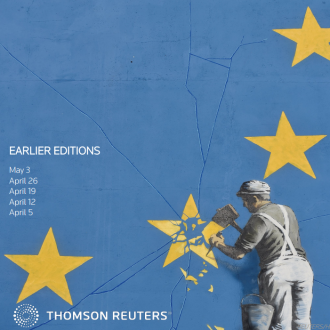
Brexit weekly - 10 May
In this issue
- special Reuters graphics that track the "Brexit effect" on sector, London finance jobs and more.
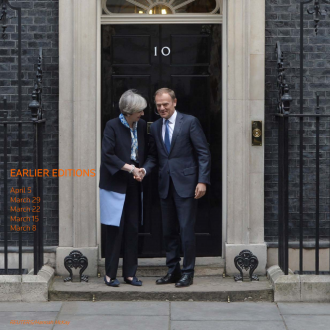
Brexit Weekly - 13 April
In this issue:
- the nuances of the EU-UK negotiations, and;
- their impacts on the country's economy
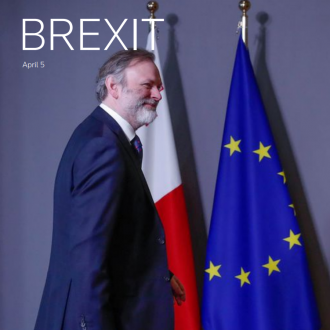
Brexit weekly - 5 April
In this issue:
- PM May's Brexit negotiations with the EU
- the financial impacts of the Brexit effect
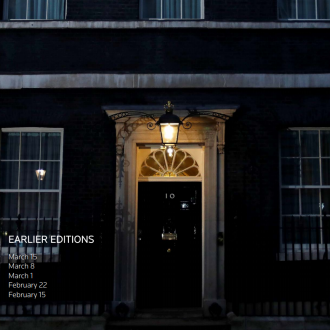
Brexit Weekly - 22 March
In this issue:
- the countdown to Brexit following on from Britain's decision to trigger Article 50
- as the implications of the UK Government’s approach to the call for a new Scottish referendum

Brexit Weekly - 15 March
In this week's issue:
- The two years of talks that will shape the future of Britain and Europe
- Nicola Sturgeon's demand for a new indepedence referendum.

Brexit weekly - 8 March
This week's issue discusses how the British Prime Minister Theresa May stands firm in negotiations and prepares to file EU divorce papers this month, plus, how UK consumers feel the pinch as inflation outpaces wage rises.

Europe after Brexit
The rhetoric from the triumphant Brexit camp was clear on 24 June. The EU, long susceptible to decay, was now condemned to collapse and the UK was better off out. This was a statement for our times, where all setbacks are viewed as catastrophes. But amid all the uncertainty about the UK’s future as it moves (gradually) towards the exit door, there is a secondary issue of primary importance: what lies ahead for the EU, and how might it change in response to the loss of one of its key constituents?

Navigating Brexit: Priorities for business, options for government
There is no doubt that there will be challenges along the way when Brexit negotiations begin, expected in March, but none are insurmountable if politicians on all sides approach them with a constructive attitude.

CII member economic outlook and Brexit survey
This edition of the CII Member Survey indicates a significant fall in confidence at the end of 2016 among CII members, across all three key indicators measuring economic, business and employment prospects. Following growth in all indices, the yearly change in 2016 is the greatest one-year fall for each index since records began in 2011.

What Does Brexit’s Article 50 Mean For Business?
Core to EU membership are the Four Freedoms – of goods, people, services and capital across borders within the Union. As Britain leaves, these freedoms will all likely be affected, potentially impacting long-term business and investment strategies as well as the employment rights of individual workers.

What Brexit means for you
Russell Group has provided instant analysis on what Brexit means for Corporate Risk Managers and Underwriters.

Brexit weekly - 31 May
In this issue:
- The fall in the PM's election lead
- May and Corbyn's opposing EU 'no deal' stances
- The possible impact following the UK general election result.

As Parliament breaks for Summer recess, businesses remain focused on making the Chequers deal work
CBI acknowledges the government’s Brexit plan is not perfect and has gaps that need filling but highlights that the proposal is enough of a blueprint to start the process of a real trade negotiation.

Banking, insurance and other financial services if there’s no Brexit deal
This series of technical notices sets out information to allow businesses and citizens to understand what they would need to do in a ‘no deal’ scenario, so they can make informed plans and preparations.
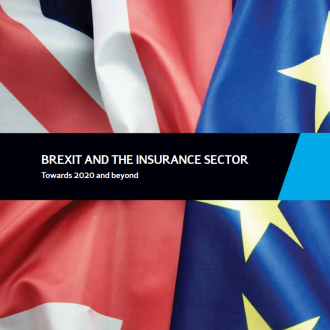
Brexit and the insurance sector
A report as part of Kennedys' ongoing commitment to providing key business insights on Brexit and how it is likely to impact on the UK’s insurance sector.

Focus area: What Brexit means for the insurance sector
As the political negotiations between the UK and EU unfold, Kennedys has created a hub to keep you up to date on the latest Brexit developments and what they mean for you and your business.
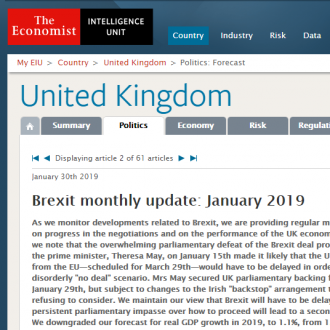
Brexit monthly update: January 2019
As we monitor developments related to Brexit, we are providing regular monthly analysis on progress in the negotiations and on the performance of the UK economy. In this edition we note that the overwhelming parliamentary defeat of the Brexit deal proposed by the prime minister, Theresa May, on January 15th made it likely that the UK's withdrawal from the EU—scheduled for March 29th—would have to be delayed in order to avoid a disorderly "no deal" scenario.
